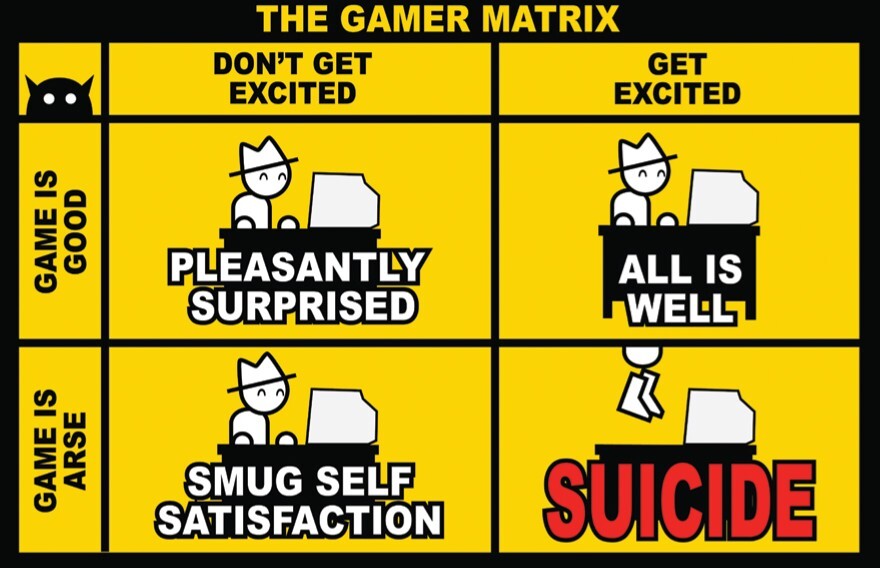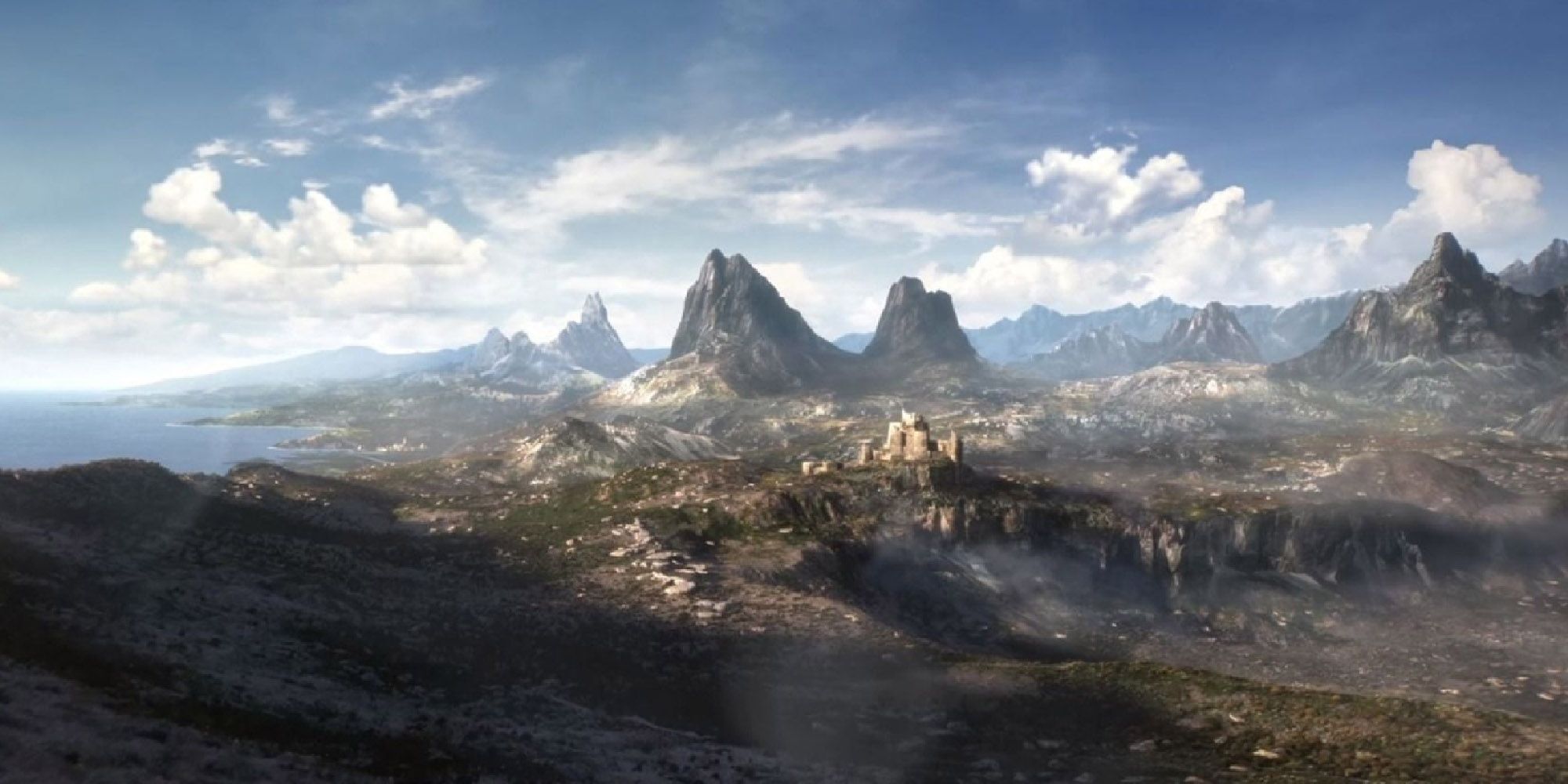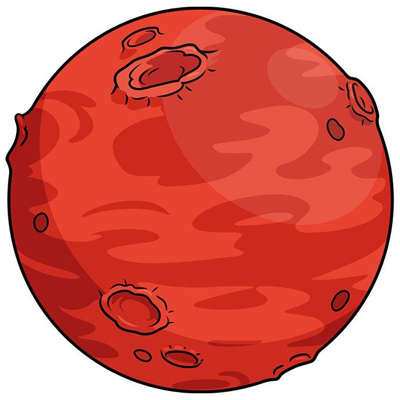I’m honestly baffled as to why people have had any faith in Bethesda Game Studios for years. Even if you liked Fallout 3 or 4, what they did with 76 should’ve obliterated any remaining trust.
This 💯🔥
I’m at the stage where you stop complaining about videogames and you just stop buying them.
I’ve realised that all the people who worked in the videogames industry that made it special have either sold out, dropped out, or aged out at this point. Keep your expectations low my friends.
Meanwhile I actually like fallout 76, I was thinking about playing starfield but after watching my friend play it, for about 14 hours before we realized it was a dry well, I’ve given up on Bethesda ever making anything that might appeal to me ever again
- Fallout 3 releases and it’s good
- Fallout New Vegas releases and it’s great
- Fallout 4 releases and it’s disappointing but it’s okay because it’s just a blip. They had some good new ideas in there, they were just balanced out in the other direction by a lot of bad ones. Bethesda’s track record is still solid, if somewhat tarnished.
- Fallout 76 releases and it’s disappointing but that’s because they’ve never made (and shouldn’t have made) an MMO before. A lot of the coverage is centred around the shoddy launch, which doesn’t really matter for a non-MMO title.
Fallout New Vegas was made by Obsidian
i know but i’m roleplaying a semi-informed fan
i think it’s fair to say that at least a portion of bethesda’s reputation is built off that game
F4 has only had staying power simply because of the modding community. It’s succeeded despite Bethesda. Modders took an extremely mediocre game and made it something much more rich and interesting.
FO4 settlement mechanism is amazing. It’s literally a 1st person city builder. I can’t think of any game similar to that yet.
It’s crazy to me how close that system was to being great and then seeing what they did with outposts in Starfield. While I didn’t really care for how it worked in vanilla, the ability to customize your base was awesome. Babysitting settlements was a chore, but SimSettlements fixes that. Starfield you can’t do much to customize it and it essentially useless from a mechanics standpoint, except for grinding a bunch of levels by cheesing time compression planets, but I’ll just use the console if I want to do that.
The problem with Starfield’s settlements is that they are entirely resource mining operations. They aren’t really settlements in the way Fallout’s are. You have to spend a phenomenal amount of time to get the perks needed to make it even remotely useful or manageable, and by the time you get there, it’s not even worth it (which is true for most of Starfield’s mechanics, IMO).
Fallout 3 was garbage compared to Fallout 1 and 2
I went and played Fallout 1 because I loved 3 so much… It took a few false starts (1 intelligence was a terrible call for a first playthrough lol, it ended bad)
Now I see it, 1 and 2 were so brilliant with the role playing and story that I can’t go back to 3! 😊 So many choices, strong characters, just brilliant.
Fallout 3 isn’t even comparable to the originals, it’s a completely different game.
The story, the world and the roleplaying are comparable and Fallout 3 is way worse in that regard. New Vegas reached the old heights again.
NV is overrated, the writing of the originals was on another level
Agree to disagree.
Elder scrolls online??? They didn’t “make” it, but they were damn familar with the mmo scene.
As you mentioned, they didn’t make ESO. Entirely different studios involved in the two games. They probably should have spent some time with the Zenimax developers before trying FO76 though.
I was weirdly forgiving of Fallout 76 (never played it, I’m not too hot for multiplayer games) because it was made so soon after fallout 4. It always felt like one of those DLC that got so large that it got released as a standalone game, which practically any large game studio has done and Bethesda did with Arcane’s Dishonored 2 and Death of the Outsider.
A huge soft spot I have for the elder scrolls comes from the heroic fantasy exploration with enormous orchestral music and adventure in every direction, something people say about Starfield is that it’s large and sparse, which is accurate for a grounded space game but goes against what makes half of Bethesda games fun. Fallout falls in the middle of the pack being far more pulpy than Starfield and in 4, I feel this was a large issue with it feeling bland; it’s pulpy wackiness was toned down when it should have gone up.
I don’t expect Bethesda to give me the video game equivalent of game of thrones but I do expect the Saturday morning cartoon that I’m equally fond of, and they still hold all the ingredients to make that recipe. Unfortunately Starfield was always tonally wrong for that, but ES6 is perfect for it.
Don’t get me wrong, I’ll still only buy ES6 a year or so after release, maybe 2-3 if it’s really crap, but I think a fair few of the ways that they’ve deviated from the working formula post Skyrim may not be an issue here.
As someone who went to the midnight launch of Skyrim and finished the main quest that night, ever since that moment I’ve been disappointed in Bethesda’s direction. Skyrim was fairly uninteresting, though the mods now can bring it some life (but still can’t make it as good as Morrowind, especially the huge UI downgrade we got with the switch to consoles). Fallout 4 does have some redeeming qualities I think, though generally it was also disappointing. Starfield is the last piece I think most people needed to wake up and see that they don’t want to make good games anymore. They only care about making a game they can market to as many people as possible, so they can’t do anything interesting with it.
The issue is most Bethesda has made at least one of many people’s favorite games. Many of the people behind them still work at the company, so they could do it again. I think there’s always some hope they can look at what makes games good (both their own and things like Baulder’s Gate 3) and realize making generic crap isn’t going to cut it anymore. It worked for Skyrim and somewhat for FO4 (though that still has some fairly unique aspects), but people have so many options for better games.
Morrowind is the reason I’m in the game industry and has impacted my life more than any other single piece of media. It’s been heartbreaking for me to see the treatment Elder Scrolls has gotten. I was so excited for Skyrim it was the only game I’ve ever preordered, it’s the reason I originally got a Steam account, and the whole game is a let down start to finish.
I was hesitantly optimistic for FO4 when I bought it, it was off-putting but I worked through the disappointment of running into invisible walls so often, and when I finally got the gear and the freedom to power armor my way to the roofs I was pumped until I discovered they put fuck all up there. Morrowind was designed with jumping and flying and they made a 3D world that was fascinating to explore, Skyrim is completely flat, FO4 pretends to have 3D space but it’s a contentless liar. I’m so jaded now I didn’t even get to the hesitantly optimistic step with Starfield I just assumed it was going to be empty filler
I wasn’t hesitantly optimistic about Starfield, rather hesitantly pessimistic. I knew they were going to fuck it up, but I thought there could be something interesting somewhere at the core. There wasn’t though. Even if there are good mods, which I’m not sure of at this point, I don’t think Starfield can be worth playing. I love sci-fi, so I would put up with a shit game if they actually cared about the sci-fi concepts, but they didn’t even bother with that. They acknowledged the concept of things like generation ships, but then didn’t care about what made them interesting, for example.
The fact that Morrowind built it’s world as a world and then gave you tools to play in it is what makes it work so well. People in the world can levitate and breathe under water, so some people used that in the world, so you’ll find that the world utilizes it. Also, the spaces are built as real spaces mostly, but all later games built “roller-coasters” where there’s a start point and a fixed path you have to take and an exit. You don’t get to use your brain to find other options. You’re supposed to turn off your brain and follow the quest marker and that’s all. It really sucks.
I’m always stupidly, but reservedly, hopeful that any studio will realize people play their games most frequently to engage them in interesting ideas, not to disengage from them or they’d watch a movie. BG3, making as much money as it has and being as classic an RPG as it is, has given me hope that larger studios will realize their mistakes. If Bethesda put their budget behind a classic RPG then they’d do huge numbers and make another new classic, but I know they won’t.
The industry always takes all the wrong lessons from successful games. For example, Successful Cool Game (SCG for short) has new technology x. The rest of the industry will ignore everything that actually made the SCG fun and engaging and focus on tech x, because obviously, the new amazing tech x is what made SCG successful! Hey, code monkeys, spend the next 18 months developing tech x, 6 months on the actual game content, then we’ll spend over half of the$150 million budget on marketing and bam, we have a sure-fire hit! The game fails, and they fire all the code monkeys and close the studio. Rinse and repeat.
IMO the problem at this point is leadership. They’ve realized people will buy their shit if they sell a cheap, surface-deep fantasy with interesting visuals and let folks do a very limited number of different things in a single playthrough. Because of that, there’s no nuance to their worlds. They want to make a sandbox game with no reactivity.
Unless leadership resigns I won’t expect anything else than the equivalent of a gas station meal.
deleted by creator
Similar story for me, too. I’m not in the game industry, but Morrowind is the game that made me realize how great a game could be. It got me really into gaming, which made me want to be a game developer. I ended up not becoming a game developer, but that’s what got me on the path of learning to code, so it certainly affected my life.
I remember waking up early on Saturday mornings so that I could play Morrowind for a bit before my parents woke up. A friend and I would take turns playing as our different characters after school. Before that I had played Sonic the Hedgehog, Wolfenstein, and Duke Nukem – and those were fun – but Morrowind put you inside of a story, a really good story, that took place in a world that felt completely real.
While it’s too bad to see that The Elder Scrolls 6 likely won’t deliver that same kind of experience, I’m sure games like Baldur’s Gate 3 are filling that role for kids today. There are still people making inspirational virtual worlds, and players are still being changed by them.
Morrowind is the reason I’m in the game industry and has impacted my life more than any other single piece of media. It’s been heartbreaking for me to see the treatment Elder Scrolls has gotten. I was so excited for Skyrim it was the only game I’ve ever preordered, it’s the reason I originally got a Steam account, and the whole game is a let down start to finish.
I feel pretty much the same as you about those games, which makes me very curious what your opinion of Oblivion is. I’ve recently had a bit of a (belated) revelation about it, so I’m interested in other opinions and discussion.
Not the person you replied to, but in my opinion was Oblivion was pretty good, but not as good as Morrowind. Compared to MW a lot of things felt dumbed down (i.e. beast races can wear shoes, no armour/clothes layers, no spear, etc.), and although I
don’tthink there’s much they could do to make the environment more interesting,since the setting is what it’s meant to be, the dungeons felt incredibly boring and repetitive.However, I did quite like the story - especially how you are not a chosen one, which is rare for such games - and I thought a lot of the quests were pretty interesting, arguably at MW’s level or better (there are definitely some exceptions*). The Dark Brotherhood quest line especially, which is not present in MW, and is much better than Skyrim’s DB quest line.
*I will also add something that I hated: despite not being a chosen one story, it allowed you to be the head of all guilds, resulting in a quest where you may have to steal something from yourself.
Oblivion suffers from middle child syndrome. It is the transition from the weird and fantastic of Morrowind to the mass appeal of Skyrim and it doesn’t really do either of those things well. I liked a lot of aspects of it. Like the changes they made with vampirism were interesting, dimension hopping was a blast, the addition of skills providing special bonuses like running on water helped liven up the skills. There was a lot of garbage though like how the level design was a clunky mix of simplified vs. capturing what Morrowind did, UI switch to prioritize consoles but didn’t even work well for console, the overall distancing of mechanics and the world. I remember it feeling like they put a lot of work into streamlining while keeping things unique which I appreciate but they didn’t hit the mark and ended up with a lot of hollow concepts.
Skyrim never even attempted to be weird so I think it’s a lot more cohesive comparatively. Like there’s no pretending anywhere in that game about what it is and in that way they did a reasonably good job. Probably the biggest differences though is Morrowind is clearly a game made with incredible amounts of passion. Oblivion also has passion in it but there are a lot of areas you could see that were rushed or they kept the devs leashed. Skyrim’s rare flicker of care makes me feel sad mostly knowing the devs had the capacity to go hog wild with it but didn’t for probably a variety of reasons.
It’s been a good while since I played oblivion though I’d probably have to run through it again to give you a proper answer (and might change what I’ve said here as I reevaluate it fresh). What’s your belated revelation on Oblivion?
Ah, thank you for your thoughtful response. I’ve tried to condense my thoughts as much as possible, but it’s still a giant wall of text. Sorry about that.
I basically agree with most of what you said, there really is a lot to like about Oblivion. But I’ve always perceived a strange contrast in it between its excellent quest design and the way it treats the actual Elder Scrolls lore, and it has always bothered me. How could they put so much effort into one aspect of the game and so little into the other?
When people reminisce about the game, they always mention their favorite quests: The Dark Brotherhood quest line, the quest where you go into a painting, the one with a paranoid elf, the one with a backwater village full of Lovecraftian cultists, the one where all the people in a village got turned invisible, the one where a ship that’s being used as an inn gets hijacked by pirates and sailed out to sea while you’re sleeping in it, the one where an orc gladiator finds out that he’s the son of a vampire, the one were you help two brothers reclaim their family farm… And these really are some of the best and most memorable quests in any RPG ever.
But, with the exception of the DB, can you see what these have in common? They’re not Elder Scrolls quests. They have absolutely nothing to do with the setting, they’re as generic as can be. You could lift them from Oblivion and drop them into any other fantasy game, and they’d work just fine with basically no adjustments needed.
When the game does make contact with the Elder Scrolls universe, it almost always does so in the most halfhearted and perfunctory way possible. The examples that stick out most in my mind are Boethiah’s quest and Mankar Camoran’s speech in Paradise. What sinister task does the Prince of Plots, whose domain is deceit, conspiracy, secret plots, assassination, and treason, have for you? Go into an arena and kill some dudes one after the other. Like… really? That’s a Mehrunes Dagon or Molag Bal quest, not a Boethiah quest! And the baddie, a supposed expert on all things oblivion, gives you a speech near the end of the game, during which he rattles off the names of some daedric princes and the planes of oblivion they rule over. Except that he gets every single one of them wrong. The writer threw in some TES terminology with no regard for what it actually means in the same way that Star Trek writers throw in technobabble.
These are just two examples, but you notice stuff like this all over the game if you keep your eyes open. Most of the people working on the game, with the exception of the DB quest line designer/writer and maybe a handful of others, clearly didn’t give one singular crap about its setting, avoiding it as much as possible and putting in the bare minimum effort otherwise.
Now the revelation I’ve had is not that the game is like this, I’ve known that for almost twenty years. It’s why it’s like this. It finally clicked as a result of combining three ideas:
One, I recently watched a video by Zaric Zhakaron in which he points out that the people who created The Elder Scrolls left the company decades ago. He argues that Starfield’s worldbuilding stinks in comparison to Bethesda’s previous games because it’s the first game in decades where the developers actually had to do some themselves, they couldn’t simply insert new quests and stories into a world that had been made by others and that they simply inherited (TES) or purchased (Fallout). And it turns out they suck at it. There was barely anyone left of the old Bethesda after Morrowind.
Two, modern Bethesda has no balls. Old Bethesda made a variety of different games, some of which were highly innovative both in terms of technology and design (e.g. it was Terminator: Future Shock, not Quake, that pioneered 3D enemies and mouselook in first-person shooters). But then Morrowind became a huge hit, and the price of success was the company’s soul. It spent the next twenty years making the same game over and over with different coats of paint.
And three, I had a brief discussion about Assassin’s Creed: Black Flag. It’s a game I like a lot, but whenever I talk about it, I tell people that it’s an excellent pirate game whose biggest flaw is that it sometimes forces you to leave your ship and play Assassin’s Creed. It’s pretty clear the developers wanted to make a pirate game, but they still had to contort it into the AC straitjacket for marketing reasons.
I’m sure you can tell where this is going. You said Oblivion was made with passion, and that’s only half true. Yeah, the developers clearly did want to make a good game, and in many ways they succeeded, but they had no passion for The Elder Scrolls, because it wasn’t their setting. They hadn’t made it, it was just a leftover from some guys who no longer worked there, and as a result the new guys didn’t know or care very much about it. They still had to make a game in it, though, because that’s what the fans wanted. The result is a rather formulaic game that distances itself from its own setting whenever it can, yet is unable to develop its own identity because it would clash, and mangles it when it can’t.
Maybe I’m just slow and this stuff was obvious to everyone twenty years ago, but I feel a strange sense of closure having figured it out. If you made it this far, thanks for reading.
Not the person you replied to, but for me Oblivion has some long and rich faction quests, really interesting side quests, and Shivering Isles basically adds an entirely new game to it, there’s so much to do there.
However, my biggest issue is that the leveling system (particularly the level scaling) is completely broken. If you rise anywhere above lever 5 or so, the difficulty ratchets up so much it makes the main quest nearly impossible to complete. I know level scaling is a big topic in the industry, but for me, the way it’s implemented nearly ruins what is otherwise a mostly great game.
I also wish you weren’t able to join all the factions. Like, if you’re high up in the Mage’s Guild, why tf would the Fighter’s Guild want you to join them? That was something Morrowind did really well. You really had to be deliberate about those kinds of choices.
If you rise anywhere above lever 5 or so, the difficulty ratchets up so much it makes the main quest nearly impossible to complete.
Didn’t Oblivion already have the difficulty slider? You could just adjust that, no?
I know level scaling is a big topic in the industry, but for me, the way it’s implemented nearly ruins what is otherwise a mostly great game.
Two of the first RPGs I played were Gothic and Gothic II which released approximately alongside Morrowind and Oblivion, and they just had no dynamic level scaling at all, so I don’t really see the appeal either. A tiny Mole Rat being roughly the same challenge as a big bad Orc just breaks immersion. If you were to meet the latter in early game it would just curb stomp you, which provided an immersive way of gating content and a real sense of achievement when you came back later with better armour and weapons to finally defeat the enemy who gave you so many problems earlier. Basically the same experience you had with Death Claws in Fallout New Vegas when compared to Fallout 3 - they aren’t just a set piece, they are a real challenge.
The games had their own problems, for example the fighting system sucked, and I’m told the English translation was so bad the games just flopped in the Anglosphere, putting them squarely in the Eurojank category of games. But creating a real sense of progression and an immersive world were certainly not amongst their weaknesses.
To be honest, Bethesda’s best work is probably behind them. They will sell a few more games based on brand recognition and because we are suckers, but I don’t expect much. I’m old enough to have seen many of my favorite developers go through this. It’s difficult to have overwhelming success and keep knocking it out of the park with every release. Expectations for something better than the last thing are so high, the pressure to do something new, the culture change that comes with huge growth, and they eventually lose that magic that captured us in the first place.
I’ll preface this by saying that in no way do I expect that ES6 will shine more than Starfield and nothing I’m about to say should be construed as such.
I personally think that Starfield isn’t a good representation of what modern Bethesda will do with ES6. Starfield is the first time any of the major players had been involved in a totally new IP.
Skyrim was mechanically good enough, but it was only interesting because it was built in a world that was already rich with lore. It built upon a strong foundation of interesting concepts, conflict, and history to move a timeline forward and on top of that allowed for modders to easily expand it further.
Fallout 3 and 4 followed the same formula as Skyrim. Build a mechanically good enough game built on a rich world and allow modders to expand it.
Fallout 76 was the first departure from building on what was already there and it was a disaster because it wasn’t mechanically good enough.
Starfield is a new departure by making something that’s mechanically good enough but also needing to build a whole universe from scratch which left it feeling dull for many.
ES6 represents an opportunity for Bethesda to go back to the formula that worked for them until now. There is a big risk that they will further streamline the gameplay making it less deep as they have done with every generation, but it’s not a guarantee at this point in time.
Personally, I found it particularly damning, how generic all of it was. They had a really interesting, diverse world with Morrowind. Then Oblivion was already a severe step backwards with relatively generic high fantasy. And Skyrim felt even more samey to me.
Well, and now with Starfield, I already start sleeping when I hear the name. What is it supposed to be?
AstrologyAstronomy Simulator 2024? Did really no one in that management meeting have a better idea for the premise other than that it’sFalloutin space?To some degree, obviously it’s not supposed to be fantasy, so maybe they’ll actually be more creative with that, again, but with them now belonging to Microsoft, too, I just fully expect design by committee.
Did you play Starfield? It’s definitely got plenty of ideas. It just chickened out of some of them and wrote checks it couldn’t cash for others. (Also, I think you meant astronomy, not astrology.)
All the new ideas in Starfield fall into one of two categories:
- The technology doesn’t exist to implement it.
- The talent at Bethesda is incredibly ill-suited to implement it.
The Bethesda response to fans saying their main storyline was trash was to make a game where the main storyline is the primary focus and draw of the game? That’s a bold move.
The NG+ stuff is a cool idea, but again, Bethesda just fundamentally lacks the talent to implement it. You can’t hit what they were aiming for with a handful of gimmicks. I wouldn’t even trust the team behind New Vegas, or whoever writes at Larian, to do it justice.
I would absolutely trust Obsidian to handle the NG+ angle that Bethesda was aiming for, because they would have known that the right way to do it is to not let you do every faction’s quest line in the same playthrough.
I don’t even mean I wouldn’t trust Obsidian. I mean I wouldn’t trust the specific team they had working on New Vegas, which was an absurdly stacked deck that they seemingly haven’t been able to re-create since.
Films you can re-watch twice and have it be just as good the second time are rare. Bethesda wanted a film you could rewatch ten times while simultaneously larping as a cosmic god and trying to break everything you could.
But this isn’t a film. People replay systems-driven games all the time, because you can tweak the variables and make it feel new. RPGs have done this plenty of times. Interacting with a separate quest line that occasionally intersects with things you did in one of your previous timelines is something that there is absolutely a way to do, and Obsidian has made exactly that type of systems-driven RPG plenty of times.
All of the stories were like that in starfield. If I could sum it up it would be “jack of all trades, master of none”. Too much stuff crammed in and none of it fleshed out well enough.
Base building was fun, until it was tedious because they only half automated the process.
Ship building was fun, except you could only customize to a point.
Exploration was fun, except they only made really 10ish buildings to just spawned them everywhere instead of generating custom ones (I fought at the same building at least 2 dozen times)
With exploration, we want you to wander through giant spaces and planets, but give you no explorer or vehicle to use.
We also want you to explore the galaxy fully immersed, but couldn’t solve the loading screen problem that yanks you out of the immersion.
So so many cool ideas that you can tell the committee was just like “no, it’s not with finishing that, players will be fine with it”. The entire game feels like it was built by committee.
It’s SO LINEAR!!!
I want FREEDOM!!! I DONT WANNA JOIN THE DORKY NASA BOYS, I WANNA CANNIBALIZE THEM!!! ):< (this playthrough)
I loved Morrowind when I was 12, replayed it recently and it was just as good as I remembered. I was hyped on Starfield and bought it blind for 40e. I don’t usually make mistakes like these but I got cocky this time. I still can’t fathom how uninteresting Starfield was. I literally dropped it out of boredom. How can you manage to do this with a space game ? seriously ? how do you create something so bland from a premise so exciting ? with the funds and time you have ?
Without upgrading to a new enginge, something that the entire industry has been begging Bethesda to do now for at least a decade, ES6 will feel exactly the same as pretty much all of their games since Oblivion, with the same “go here, kill everything indiscriminately, pick up trinket, deliver trinket” gameplay loop. ES lore is top tier and I’m always down for more of that, but they need to update their shit.
How would a engine change affect the game design philosophy of Bethesda?
Performance? Visuals? Alright. But game design?
Creation Engine powers Starfield and Fallout New Vegas. Quests can be complex, dynamic, with multiple endings, with lots of ways to approach them. Or they can be flat fetch quests. The tools allow both and everything in between.
Bethesda just chooses to use the current game design framework and would choose the same on any other engine.
They are actually updating their game design principles. They stopped using game design documents, they simplified the quests, they try to make sure every play through gets to see as much content as possible. Maybe they should stop updating.
A newer engine would get rid of chests hidden into the ground for storing NPC’s items.
I mean, this is an obviously laughable example but you can be sure that other quirks of the engine are holding back creativity and performance.
As I said Creation Engine did mot stop another studio from being creative.
They are not being hold back by Creation Engine in game design, they are stuck in a design philosophy and production strategy that until now has and got them lots of praise and sales.
They use the chest trick because saves reworking the inventory and container system. That would take time and left the game almost the same, so they don’t.
If they used Unreal engine they’d have to build a new inventory and container system from scratch, who knows if they would end up taking the hidden chest idea (it mostly works) and porting it?
The “Update your engine Bethesda” discussion is valid from many points of view, but most of the problems with current Bethesda releases are cultural. They don’t test nearly enough, they don’t have a “fun” game until a couple months before release, they don’t coordinate the content and mechanics production in any way, the quest writing is a free for all.
And until now things worked out. So they refuse to address those issues.
Actually, you can argue that they are still limited by what the engine can do - which, in turn, means it affects game design due to the fact they might want to implement an idea, but either they would need a hacky way to do it (like trains in Fallout 3 being a fucking equippable hat with an NPC running underneath the map, which is probably why their Fallout games don’t have drivable vehicles) or simply cannot due to technical limitations of the engine.
This is like saying a good wood carver can still be good if they have shoddy tools, when the reality is that a good craftsman is only limited by the quality of tools they have. If I can’t fully realize my wood carving because my knife is too blunt and do the best I could with what I have for an inferior design, is that my fault or the tool’s fault?
I thing you are looking at this backwards.
They have the money and resources to change engine. They CHOSE not to. Because they can make the game they want to make faster and more efficiently on Creation Engine. If they could not make the game they want they would be forced to move to another game engine.
If their idea for Elder Scrolls 6 can be made in CE they won’t change engines. If it does not, they aren’t some indie studio, they have the resources to swap.
Two things: 1) You’re making it sound like swapping engines is incredibly easy (it’s not, and you have to train staff on how to utilize it from the ground up and that can take a while), and 2) you’re probably right on why they keep using CE, and the sad reality is that Bethesda absolutely intentionally designs uncooked barebones games because they realized they can just have the fandom make actual interesting content, or QoL changes. They also know that
CreationGamebryo Engine does limit them a lot to what they can do, but rather than going through the cost and time of changing over engines, they just let the fandom create the script extenders that are available for literally every single game of theirs since Morrowind so modders can literally do things the base game can’t let them do.So this is more of a case where the craftsman has shoddy tools, but they don’t care because they’ll churn out a piece-of-crap and have their audience improve it for them for free. And then the craftsman will have the gall to try and get a cut of the audience’s work somehow.
It’s not easy to change engines. But they could afford it, if they could justify it.
I think you overestimate how many people actually install or care about mods. Many people just seems to like what Bethesda does.
Oblivion was a smash hit on Xbox without mods. Since that the main sellers seems to be the console versions.
They use the chest trick because saves reworking the inventory and container system. That would take time and left the game almost the same, so they don’t.
And if they used a new engine they would have to rework the inventory and container system, and if they did that perhaps they would innovate on that system in some way since they are making big changes anyway.
They don’t want to. They have a formula, and the public and the market have spent decades saying that it’s good enough and want “Skyrim in Space”
If they want to change how inventory works they can, in whatever engine they are using. But why would they?
Also, I find pretty ironic to expect “Innovation” in a game with a number 6 attached to it, from a studio known for doing 3 franchises so similar to each other in gameplay and features that are used to describe each other. And to blame the tech for the lack of it.
Good. Then, you can only be positively surprised.

No, you can be many more things than that. Skyrim killed my hype for anything else Bethesda made, but I was still hopeful for a cool sci-fi game with Bethesda issues. I didn’t expect much from Starfield, but I was still left with a sense of disappointment. It’s not that I expected anything good, but I was still somewhat hopeful that it could be interesting, but it refused to be. There wasn’t any surprise element to what I felt, just a tinge of loss at what we could have had if the company tried to make good games still instead of making marketable games.

















